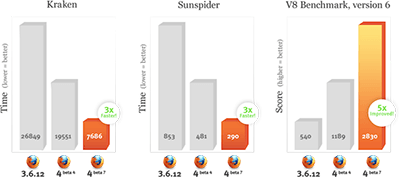- Qualcomm Launches Snapdragon 4 Gen 2 Mobile Platform
- AMD Launches Ryzen PRO 7000 Series Mobile & Desktop Platform
- Intel Launches Sleek Single-Slot Arc Pro A60 Workstation Graphics Card
- NVIDIA Announces Latest Ada Lovelace Additions: GeForce RTX 4060 Ti & RTX 4060
- Maxon Redshift With AMD Radeon GPU Rendering Support Now Available
Firefox 4 Beta 7 Released
Normally, we wouldn’t announce new versions of beta software, but a rare exception can be made here. Firefox 4 has been at the forefront of my mind for quite a while, promising much needed enhancements to a somewhat aged browser. Firefox 3 was met with a fair amount of criticism, it was slow compared to the competition, lacked feature sets such as plugin separation, and suffered numerous small, annoying bugs. Over time, much of these had been cleaned up and extra features slowly added, but its overall performance has remained sluggish.
Firefox 4 promised a complete overhaul of the browser. New UI, updated tab management, new javascript engine, support for developing web standards and an overall, much faster browsing experience. Up till now, the public beta’s have been rather lackluster, introducing a few new features, minor interface changes and an inexhaustible list of bug-fixes. Nothing really screamed new and exciting, since it pretty much felt like Firefox 3 with a new lick of paint.
The latest beta 7 release has finally started to show what the new Firefox is made of, relighting that fiery tail it once had. The introduction of the new Javascript engine, JagerMonkey, really brings the ‘fox back up to speed with modern browsers. WebGL, the hardware acceleration engine for various graphical rendering operations has been enabled on Windows and Mac OS X, utilising Direct3D and OpenGL respectively. Intel GPUs are currently unsupported. HTML5 features have been boosted with support for Forms and video buffering. A dash of polish can also be seen with support for OpenType font features for various Typographic effects.
There are still a few kinks to work out, the usual slew of bugs, but Firefox 4 is finally showing promise and living up to the hype it’s been building for the last year or so. If you’re willing to give the beta a go, you can download the latest beta here and the full release notes here. I’m actually excited for a change…

A new release of Firefox 4 Beta is now ready for you to download and test! This release boosts performance in some important ways: it adds the JägerMonkey just-in-time (JIT) JavaScript compiler; adds more support for hardware-accelerated graphics, as well as hardware acceleration for Windows XP and Mac OS X; and enables 3D capabilities, without the need for plug-ins, with WebGL.




